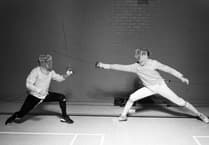WHEN the ideas of what to write for the "Courier" dry up, it is always a good idea to ask a former player for some snippets of information on their past games, their opponents and of course former team mates.
Unlike fishermen and their tales of glory, rugby players are not prone to exaggeration (apologies to any anglers who may read this but it is meant only in jest) and there are probably good reasons for that, well one good reason anyway and that is of course that there is usually someone still around who could contradict any embellished tales of "derring do" on the rugby pitch.
Ian Gillard is one such player, a member of the well-known Gillard family of footballing fame in Crediton and beyond and one who "saw the light" when he switched codes as a young man in 1986, turning out firstly for the Colts and continuing into Senior Rugby.
Gilly played more than 500 games for the Club, 416 in the First XV but with all those games under his belt, his view was that it is difficult to remember one particular game and that if any do stick in the mind it is usually the bad ones!
However, we turned the clock back to October 4, 1986, when the Colts had lost centre Roger Hedges the previous week with a dislocated shoulder and Kevin Phare asked Gilly to stand in at centre for the next game which was at home against St Austell.
It was to be his first game for the Club and Gilly remembers it not so much for the performance on the field but the camaraderie after the game.
The Colts recorded a comfortable 39-4 victory (yes you could score four points in those days) and Gilly thought his performance was "pretty average".
I suspect there is an element of modesty showing through as he ended the season playing in 26 games.
The Colts were coached by Bernie Blatchford, one of the most astute tactical rugby coaches around, with assistance from Alec Stentiford who also knew a thing or two.
They developed into a fine Colts XV winning 22 of their 36 games.
The team was captained by Graham Carter and included many school team mates, Paul and Alec Nixon, Julian Goddard, Kevin and Graham Phare, Ian Steer, Bruce Wallace, Glyn Hutchinson, Bryan Lee and the late Ian Ford. In addition there were Paddy Rice, Marcus Keenor, Martin Turner and Mark Woodman who were from the Chulmleigh area.
After the game, Ian was surprised that the First XV players would come over and talk to the Colts about the game and showing genuine interest in how things went.
Jack Hayes would appear, seeking information for match reports and a list of scorers. It was an eye opening experience and one that has not been forgotten.
Aside from playing all these games for Crediton, Gilly also wore the Devon shirt and indeed went on tour to Holland with the County.
When asked about the best player he had played with, there was no hesitation in naming Devon prop Julian White with whom he played for the county.
White was a regular in the Okehampton team whilst representing Devon though he went on to enjoy an illustrious career with Bridgend, Saracens, Leicester, England and British Lions.
He was barely 20 years-old when he played for Devon but, as Ian recalled, he was built like an Ox and stronger and fitter than anyone else in the squad.
So far as the best Crediton players he has played with, two sprang to mind, Jon Ward and Mick Leyman.
Ward was a hugely talented fullback or fly-half who went on to play for Northampton.
Mick was a former captain from 1984-86 and 1987-88, a very skilful No 8 who never appeared flustered but a player you would always want in your team. As Ian pointed out, both were capable of making a bad pass look good.
When it comes to opponents, Ian looked over the border to Cornwall and named the Launceston fly-half Jimmy Tucker, a class act, strong, fast and very skilful and guided a very good side.
As for Ian himself, with 416 appearances in the Crediton First XV he amassed a total of 2,138 points, the second highest in the Club’s history, only Peter Setter has scored more.
He has scored 96 tries (33 of which came at a time when a try was worth four points), 358 Conversions, 314 penalties and 11 drop goals, an impressive record for a player who probably only took up the game seriously after a chance request to fill in for an injured player.
A PERSONAL VIEW
At the risk of being what might be termed as "political", I take this opportunity to express a personal view which I have no doubt many will disagree with.
It would seem that the RFU Board together with the RFU Council have caved in to the demands of Premiership rugby and agreed to dispense with relegation for this season.
That in itself, and taking into account the current situation, is reasonably sensible.
Also, because it has not ruled out promotion from the Championship, then it will probably allow Saracens a route back into the Premiership before the drawbridge is raised.
The real issue is what follows when a four-year moratorium on promotion and relegation comes into force. This is an act of protectionism that seems grossly unfair as not only will that prevent any Club with ambition from accessing the Premiership.
Ring fencing will mean that much of what is loved most about the game, its competitive edge, will be gone.
In addition, once the four-year moratorium comes to an end, the conditions for promotion will become so stringent that it is unlikely that any Championship would be in a position to afford promotion.
It has already been hinted that as much as £20M would be required from any likely promotion candidate in order to "grease the palms" and ease the route into the Big Boys Club.
Already BT have expressed disappointment, having just agreed a three-year deal worth £110M and are possibly going to reconsider that deal in light of the changes.
The second tier Championship has had funding dramatically reduced which will make life even more difficult for ambitious Clubs to achieve Premiership status.
Sadly, all this begs the question, who actually runs the game in England?
Certainly the RFU do not seem to be in total control as they need players to be released from Premiership Clubs for international duty, an arrangement that they already pay a heavy price for and probably remain fearful of losing.
There are 1,800 rugby Clubs in England, and 1,787 of them would quite like a little more consideration especially in view of the fact that funding at the Community Club level, negligible as it was, has seen a further 70 per cent cut.
Premiership Clubs get additional funding from the RFU for running academies, a job that they generally do pretty well.
However, without the Junior Clubs creating the first stepping stone for players and without any financial assistance, it is highly unlikely that the academies would function.
Rugby in England should not be all about the Premiership, in fact much of what it serves up to the rugby fan is pretty dire stuff and with the number of non England qualified players now appearing on our screens, we might just as well be watching The Currie Cup.
Paul Harris




